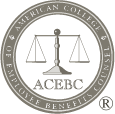Louis H. Diamond
Louis H. Diamond died in 2020 at age 88 after a long career that included the beginnings of the Employee Retirement Income Security Act of 1974 (“ERISA”). Ultimately a widely-known expert Employee Stock Ownership Plan (“ESOP”) practitioner, Lou was inducted as a Charter Fellow of the American College of Employee Benefits Counsel (the “College”) in 2000.
After his B.A. in accounting from George Washington University in Washington, DC in 1954, Lou earned his Certified Public Accountant certification in 1956. He received his J.D. cum laude in 1957 and served as an Associate Editor of the Law Review at the George Washington University National Law Center (renamed George Washington University Law School in 1996) before obtaining his LL.M. in Taxation from the Georgetown University Law Center in 1965.
In 1957 to 1960, as a First Lieutenant in the U.S. Army, Lou served in the Judge Advocate General’s Corps, mostly in Fort Leavenworth, Kansas, but later also at Fort Riley, Kansas in the 1st Infantry Division (known by its nickname, “The Big Red One”).
Lou worked in Washington DC for the rest of his legal career. He began as an Attorney Advisor at the United States Tax Court from 1960 to 1962. In the 1970s, he practiced at the law firm of Danzansky, Dickey, Tydings, Quint and Gordon which after a merger in 1981 became Finley, Kumble, Wagner, Heine, Underberg & Casey (which later became Finley, Kumble, Wagner, Heine, Underberg, Manley, Myerson & Casey). Finley Kumble was dissolved in 1987. Lou later worked at Keck, Mahin & Cate which stopped operations in 1997. From 1995 to 2005, he was a partner at Silverstein & Mullens, P.L.L.C. which in 2000 became a division of Buchanan Ingersoll & Rooney, P.C. He became Senior Of Counsel for Paley Rothman Attorneys at Law, and the Managing Member for Diamond ESOP Advisors PLLC.
He worked in all areas of taxation, estate planning, and employee benefits. He actively helped the understanding of ERISA from the early days, evidenced by his membership in the American Bar Association’s Special Subcommittee on Legislative Changes of the Committee on Employee Benefits in 1974 and his article “Funding Liability under Union Pension Plans” published in the “Journal of Accountancy” in September 1975. A colleague from Lou’s early career recalled that during the 1970s and 1980s, Lou had a national reputation for representing professionals and small businesses as a tax attorney with an emphasis in structuring employee benefits plans of all types. Considered one of the most knowledgeable, creative, and effective attorneys in his field, he was highly sought after by businesses across the country. Lou was made a Fellow of the American College of Tax Counsel in 1983.
He developed a particular specialty in the technically-complicated ESOPs which allowed transfer of ownership of companies to employees. Lou gained broad ESOP experience by representing owners selling stock to an ESOP, employees pooling ESOP funds to purchase their division or subsidiary from corporations large and small, banks and others making ESOP loans, and ESOPs themselves and their trustees. In one of his notable achievements, he represented the employees of the engineering arm of the Illinois Institute of Technology Research Institute to form Alion Science and Technology in a 2002 $130 million employee buyout of operating assets.
An active participant and leader in many organizations in the employee benefits community, Lou served as Chairman of the Legislative & Regulatory Advisory Committee of the ESOP Association. In 2005, Lou testified before the IRS on behalf of the ESOP Association during a public hearing held April 20, 2005 regarding proposed and temporary IRS regulations aimed at abuses of ESOPs. He was a member of the ESOP Subcommittee of the Employee Benefits Committee of the Section of Taxation for the American Bar Association and was Chairman, Vice Chairman, and Special Advisor to the Section’s Committee on Tax Accounting Problems. He served as a member of the National Center for Employee Ownership.
Generous in sharing his impressive knowledge with others, Lou was an engaging speaker and willing reader of papers on ESOPs. Fondly remembered by his mentees as being supportive, Lou treated them with respect and was instrumental in developing them as attorneys. Lou taught as an Adjunct Professor at the Georgetown University Law Center from 1971 to 1978. A frequent speaker at employee benefit and tax conferences, he appeared regularly at the annual conferences of the ESOP Association, the American Institute of Certified Public Accountants, and others.
He contributed his knowledge and skills as a member of the Benefits and Compensation Editorial Advisory Board of the American Institute of Certified Public Accountants’ Journal of Accountancy and as ESOP Chair for the Tax Management Compensation Planning Journal. He wrote numerous ESOP-related articles and papers in “The Tax Advisor” and “The Compensation Planning Journal,” and authored Portfolios 303 “Accounting Methods - Adoption and Changes” (1986) and 46 “Accounting Methods - Definition and Permissibility” (1979) for the Bureau of National Affairs “Tax Management” series.
College Fellow Norman P. Stein in a 2003 introduction of Lou for the Annual Meeting of the Association of American Law Schools Section on Employee Benefits, described Lou as one of the nation’s leading authorities on ESOPs and noted that early in Lou’s career, he was a partner of Louis Kelso, who pioneered and championed the modern ESOP as a means of providing rank-and-file employees with a proprietary stake in their employer. Friends and family remembered Lou as being amazing and brilliant, an incredible genius who was very talented. As Norm Stein reflected, “[a] lot of history and knowledge of employee ownership—law, culture, and impact—was lost when Lou died.”
Photo Source: The Decade Book, American College of Employee Benefits Counsel 2000-2010


